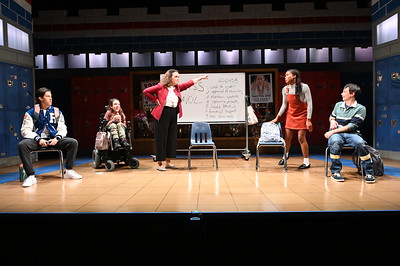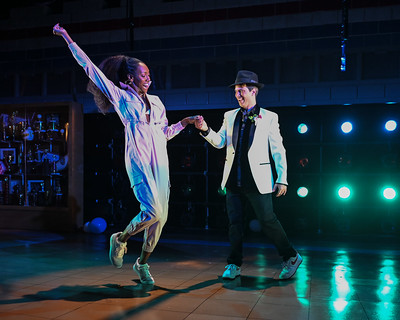Presented by The Huntington
Produced in association with Woolly Mammoth Theatre Company and Pasadena Playhouse
Written by Mike Lew
Directed by Moritz von Stuelpnagel
Assistant direction and movement coordination by Ashleigh King
Choreography by Jennifer Weber
Fight choreography by Robb Hunter
December 3 – January 2, 2022
Calderwood Pavilion at the BCA
Boston, MA
The Huntington on Facebook
Critique by Kitty Drexel
Content warning: Disabled people exist everywhere 24/7. If this play “expands your world,” you should know that’s ableist, and it’s really not about you.
BOSTON — This one time, in the Before Times, I was taking an ashtanga-style yoga class, and a random woman told me I was “inspirational.” I was dripping in sweat after having performed 60-minutes of intermediate poses with only one arm, and a brunette Karen in Athleta and Lululemon compression wear decided it was super important to tell me that I inspired her. She didn’t say what I inspired her to do, just that I was “inspirational.”
I wish I could say that I told the Karing Karen she inspired me to vomit a little in my mouth, but I was too shocked to say much of anything. I picked up my mat, and I skedaddled out of the studio to fume inspirationally in peace.

This horse can’t even do yoga.
I live with brachial plexus palsy, a permanent paralysis of my left arm from my shoulder through my fingers. (Coincidentally, it’s also the sexiest of the palsies.) Sometimes complete strangers find my ability to do completely normal, everyday things Inspirational. Showing up to yoga is difficult for everyone, Karen.
Abled people have a nasty habit of deriving inspiration from the inabilities of disabled people. We aren’t inspirational just because you find relief from not being disabled. Your inability to see us as people with lives is a You problem. As Buck says in Teenage Dick now at The Huntington, “Please don’t involve me.”
Stella Young was inspirational for changing the public dialogue around disability representation. Adding a ramp to a Boston building with a grandfather clause is inspirational. I’m not special because I got off my well-toned butt to do some vinyasas in a room full of sweaty strangers for $15.
Teenage Dick (the play, you perv) by Mike Lew, currently at The Huntington, is inspirational. It presents disabled individuals as three-dimensional human beings with wants, needs, and the pure, dark rage that lurks in all hearts of men. It should be a regular practice in the theatre to present people as they are and to cast disabled people as disabled characters. It is not.
Teenage Dick is a reimagining of Shakespeare’s Richard III. Highschool junior Richard (Gregg Mozgala) has suffered at the hands of his tormentors at Roseland High long enough. He schemes to seize power over his fellow high school classmates by rigging the student elections in his favor. He will become senior class president and show them all!

Louis Reyes McWilliams, Shannon DeVido, Emily Townley, Portland Thomas, Gregg Mozgala in “Teenage Dick.” Photo: Teresa Castracane
His plan involves four steps. Richard tricks teacher Ms. York (Emily Townley) into sponsoring his campaign. Then he obliterates his competitors: evangelical priss Clarissa (Portland Thomas who turns tantrum throwing into an art), and current junior class shocking jock president Eddie (Louis Reyes McWilliams). He seals the deal with an assist from Richard’s only friend Buck (Shannon DeVido who rocked in last summer’s breakaway hit, the indie movie Best Summer Ever. (If the COVID news is dragging you down, this movie will give you the lift you need. It’s jam packed with joy.)) The last step is to nab the most popular girl in school, Anne Margaret (Zurin Villanueva who dances like a dream).
Richard is set to finally rule the school until his soft feelings for Anne get in the way. He will either grow a soul or a spine. Richard cannot have both.
Richard faces three adversaries in Teenage Dick. Each adversary represents one of the many factions within society that stand in the way of the disabled community’s autonomy.
- Clarissa: religious persecution expressed through prayer and forced healing touch. (If we wanted your god to “fix us,” we still wouldn’t ask you to pray for us.)
- Eddie: patriarchal oppression by apathetic ruling classes, government, or other abled social class that neglects us to “protect us” despite the ADA.
- Ms. York: another expansive majority that feels so threatened by our existence that they infantilize the disabled community by assuming we are asexual angels who exist to teach society solely to be their better selves. (Just… no.)
Although he’s not a hero – he’s not even an anti-hero – it is satisfying as a disabled person to watch Richard crush his opponents/symbols of oppression. Many’s a time I wish I could destroy them too.
It’s inspiring to see Richard respond to his adversaries with cunning, intelligence and wit. Here’s a guy who knows his strengths and utilizes them to his best vantage. Richard is like a sober Tyrion Lannister without any of the charm. And he has cerebral palsy.
That’s the greatness in Lew’s writing. Richard’s disability doesn’t factor into whether or not he’s a successful villain. He is successful because he has a plan and ruthlessly executes it. In theory, if the abled students weren’t puerile teenagers nasal-gazing at their own assumed class superiority, they could do what Richard does, too.
Clarissa, Eddie, and Miss York are conned by Richard because they underestimate him. They assume he’s incapable of Machiavellian strategy, deceit, or horniness because he’s disabled. They are idiots deceived by society’s othering of the disabled community. In some respects, Richard teaches them all a valuable lesson. You underestimate us at your own risk.

Zurin Villanueva and Gregg Mozgala in “Teenage Dick.” Photo: Teresa Castracane.
Richard and Buck respond to these asinine players with resiliency and humor. Mozgala and DeVido are great in their roles. Mozgala dominates the stage with his monologues (he can take more time with his opening monologue. It’s a bit fast.). He’s not at all sympathetic as Richard, and Mozgala makes it work. DeVido is the voice of reason. She excels with punchy one-liners and dramatic pauses.
The sound engineer in charge of DeVido’s mic dropped some of her lines on Wednesday night. DeVido’s mouth was moving but her mic didn’t pick up her voice.
I directly relate to Richard and Buck (as well as Mozgala and DeVido. People stare at you when you’re disabled in public. On the stage, you get to choose when and why people stare.). High school is a very special hell for disabled kids. We process the same hormones as abled teens with the added bonus of severe othering as we publicly negotiate our identities.
Don’t believe me? Think about the times you’ve watched a wheelchair user take the bus. Multiply that by 1,000% and that’s our high school experience.
As a person with limited mobility in part of her body, I appreciate that Mozgala and DeVido were staged with their abilities in mind. The fight scenes weren’t dumbed down to protect the anxious abled folks in the audience. The verbal fights had strong staging that gave both actors opportunities for physical comedy in addition to their comedic dialogue. The dance sequence with Mozgala and Villanueva to Missy Elliot’s “Get Ur Freak On” was dexterous and cheeky, not at all spazzy.
The biggest takeaway from Teenage Dick should be the fallibility of all humans. Disabled people can be good; we can be dangerously sexy, generous, kind, talented, etc. We can also be malicious, creepy trolls with sociopathic tendencies. Treat us with the same respect you expect to receive, and we won’t hurt you. Much.
